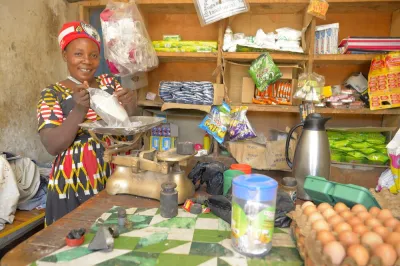Untapped Potential: Behavior Change Approaches To Address Gender Norms

Gender norms influence and shape all people’s lives. Resulting inequalities among women and men affect their access to economic, political, health, and other resources. In recent years, we have come to recognize how gendered norms around mobility, phone ownership, unpaid care responsibilities, and decision-making play an important role in limiting women’s financial inclusion. As this awareness grows, new products, channels and tools are being created to address these gender norms.
Technology, especially mobile phones are increasingly seen as a way to address mobility and privacy issues by making digital finance products available to women. However, given that 1.7 billion women do not own mobile phones, the reach of technology is limited. Similarly, when working with female smallholder farmers, subsidizing input purchases might not be sufficient if she doesn’t have the decision-making power to choose the inputs. When households make decisions about investments, the purchase of a television set or radio may be prioritized over time-saving devices such as a cooking stove or water storage, because the opportunity cost of women’s time is almost zero. In order to achieve lasting economic empowerment results for women and girls, there is a need to change the way they are perceived and sanctioned by all levels of the society including individuals, family and community.
The role of norms on economic outcomes may be a relatively new focus in financial inclusion and market systems development efforts, but significant attention has been paid to social norms in health and gender-based violence (GBV) programming as an important factor that drives behavior. Recognizing the need for tools that will encourage people to behave differently, these stakeholders developed and refined an approach called Social and Behavior Change Communication (SBCC).
Social and behavior change communication recognizes that individual and social change does not happen in a vacuum but is dependent on larger structural systems and norms.
Drawing on early lessons from social marketing efforts in the 1970’s, SBCC is the use of communication to change behaviors – including service utilization – and promote social change by positively influencing knowledge, attitudes and social norms. SBCC programs work at multiple levels of the system – individual, family, community, service delivery, and enabling environment - to achieve sustainable social and behavior change. SBCC recognizes that individual and social change does not happen in a vacuum but is dependent on larger structural systems and norms.
Among the powerful tools employed by SBCC programs are mass media, community-level activities, interpersonal communication, information and communication technologies, and new media. Research consistently shows evidence-based communication programs can increase knowledge, shift attitudes and cultural norms, and produce changes in a wide variety of behaviors. SBCC has proven effective in several health areas, such as increasing the use of family planning methods, preventing HIV and AIDS, reducing the spread of malaria and other infectious diseases, and improving newborn and maternal health.
The 2018 International Social and Behavior Change Summit is being held in Bali, Indonesia from 16-20 April. This conference is organized to understand better what works in shifting social norms, changing behaviors and in amplifying the voice of those who have most at stake in the success of development efforts.
In an effort to promote cross learning with the SBCC community, the CGAP Women’s Financial Inclusion Community of Practice is organizing an auxiliary lunch-time session on 18 April. This session, titled “Expanding BCC to New Frontiers: Making the Case in Women’s Economic Empowerment,” will bring together representatives from Women’s World Banking, Oxfam, Nathan Associates and BBC Media in Action to discuss successes and challenges on what works in shifting social norms in financial inclusion and market systems programs and the role of behavior change communication tools. The session will be an opportunity to mainstream the discussion on women’s economic empowerment and financial inclusion within the SBCC constituency and explore opportunities for collaboration.
Stay tuned for a follow-up blog from the summit where we will share our key takeaways from these discussions!


